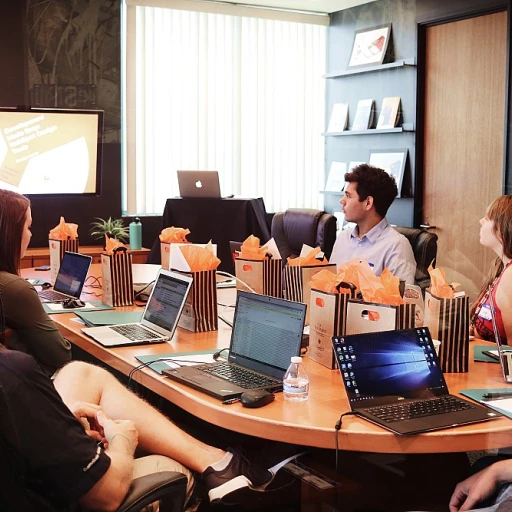
Understanding the Young Executive Programme
Unveiling the Pathway for Young Executives
The Young Executive Programme is a gateway for aspiring leaders to transform their career trajectory significantly. It offers a structured approach, equipping young professionals with essential tools to drive meaningful change within organizations. Key characteristics of this program include a blend of academic rigor and practical insights. Often in collaboration with esteemed universities, the program fuses business administration principles with nuanced leadership strategies. This strategic fusion promotes professional growth, empowering young executives to thrive in various industries such as healthcare, hospitality, and public health. Participants in this program, often those with several years experience in professional settings, benefit from exposure to complex challenges and strategic management tasks. These experiences enhance their capability to make informed decisions aligned with modern executive practices. Whether newly stepping into executive roles or strengthening their management acumen, young executives will acquire a comprehensive understanding of strategic leadership. Bridging academic learning with workplace application is a critical element that distinguishes the program. To learn more about thriving in dynamic work environments, exploring the future of work could provide further insights. This emphasis on continuous development and patient experience, resonating across different sectors, not only fosters individual success but also fortifies the leadership pipeline critical to the company's long-term vitality. The program recognizes the importance of strategic planning and adapts to the evolving contours of executive education, making it an invaluable asset in the professional journey of young leaders.Aligning Young Executives with Company Vision
Fostering Alignment with Vision and Goals
For any leadership program to truly empower future leaders, it's imperative to align its objectives with the company's vision and long-term goals. This harmonization ensures that young executives not only understand, but also embody the mission and values of the organization in their daily operations. Through the Young Executive Programme, businesses have the opportunity to shape executives who are well-versed in company culture and strategic direction, thereby enhancing their overall impact on organizational success.
One of the crucial aspects of this alignment is embedding strategic planning exercises within the curriculum. By integrating these activities, young professionals are groomed to think critically about challenges and opportunities that align with corporate aspirations. Educational modules can be tailored to reflect the company's unique market positioning, blend of products or services, and industry-specific dynamics. For instance, a program tailored for the healthcare industry will incorporate elements of patient experience and public health, whereas one designed for the hospitality tourism sector may focus on customer satisfaction and international market trends.
Additionally, many programs leverage partnerships with universities and business schools, enabling participants to gain a robust foundation in management theories and applications that complement their professional experience. As executive leaders in training navigate through the curriculum, they are encouraged to apply learnings directly to real-world scenarios within the company, reinforcing their alignment with the organization's strategic vision.
Aligning young executives with company vision also involves consistent refinement and adaptation of learning modules to anticipate and react to market changes. Programmes that focus on continuous improvement ensure that their contents remain relevant and that young leaders are not only prepared for present-day challenges but are also equipped to spearhead future innovations within their companies. To explore more about thriving in this dynamic environment, check out these strategic insights.
Developing Strategic Thinking Skills
Building a Strategic Mindset
In the realm of executive leadership, developing strategic thinking skills is vital for young professionals aspiring to lead organizations in the rapidly evolving business landscape. It's a crucial component of the Young Executive Programme, which emphasizes equipping young executives with the tools they need to navigate complex challenges and seize opportunities for growth effectively. The programme focuses on enhancing the young leader's ability to think critically and strategically. It challenges them to look beyond daily operations and consider the broader business and management implications. By fostering this mindset early in their career, these future leaders will learn to anticipate market shifts, understand the competitive landscape, and develop strategic plans to guide their organizations into new areas of potential growth. To cultivate these skills, the program integrates real-world business scenarios that require deep analytical thinking and encourage innovative solutions. Participants often engage in workshops and simulations that mimic actual executive responsibilities. This approach not only improves the application of theoretical knowledge but also bolsters their ability to make informed decisions that align with the company's vision and values. Furthermore, leveraging digital tools and platforms is an essential aspect of this strategic training. Executive leaders today must be adept at using the latest technologies to drive business value. In light of this, young executives are encouraged to explore the digital transformation in management and its implications for their strategic planning skills. For insights into this area, they can reference important discussions on telecom management, which serve as case studies in the program. Crucially, the ongoing development of a strategic mindset among young professionals also relies on continuous improvement and learning. This emphasis ensures that they remain adaptable, ticking the right boxes in a world where patient experience and effective healthcare strategies are as critical as financial success. Through years of experience and strategic business administration, the Young Executive Programme primes young executives for a landscape that rewards agility and foresight.Mentorship and Networking Opportunities
Enhancing Leadership through Mentorship and Networking
A pivotal component of empowering young executives is providing them with the professional guidance and social connections essential to their growth. Mentorship and networking opportunities within leadership programs play a crucial role in cultivating well-rounded executives poised for future success. An effective mentorship program pairs young professionals with seasoned executive leaders, fostering an environment where valuable business administration and strategic planning insights can be exchanged. This relationship not only helps young executives navigate their current challenges but also prepares them for future roles in high-stakes environments like healthcare and hospitality tourism. Additionally, networking is indispensable in the executive leadership development process. Building a robust network both within and outside the organization exposes young executives to diverse perspectives and practices. Engaging with professionals across different sectors enhances their understanding of public health, patient experience, and other key areas, enriching their overall executive education. Leadership programs focused on networking prepare future chief executives to excel by connecting them with peers, potential collaborators, and mentors drawn from a wide array of professional backgrounds. This exposure introduces them to innovative approaches in continuous improvement and management, essential for thriving in today’s rapidly evolving job market. To truly maximize the impact of mentorship and networking endeavors, organizations should tailor their programs to align with the unique needs and aspirations of their young executives. Encouraging participation in industry-specific events and leveraging professional social media platforms are both strategies that can effectively broaden their horizons and stimulate professional success.Measuring Success and Impact
Assessing Program Effectiveness and Leadership Growth
Evaluating the outcomes of the Young Executive Programme is crucial in understanding its impact on the participants and the overall organization. Measuring success and impact can be approached through various methods that capture both qualitative and quantitative indicators of growth and development. Firstly, feedback from the young executives themselves provides valuable insights into their personal and professional growth throughout the programme. Their reflections on how the experiences have enhanced their strategic thinking skills and understanding of business administration are essential in gauging the programme’s effectiveness. Additionally, monitoring the application of learned skills in real-world scenarios is critical. Observation of how young professionals implement strategic planning and continuous improvement initiatives reflects on the efficacy of the program. Tracking key performance indicators that align with the company's vision helps in assessing whether the young executives are effectively driving business objectives. In considering mentorship and networking opportunities, evaluating the engagement and relationship-building outcomes is vital. This can be seen through expanded professional networks and mentorship dynamics, contributing to a better understanding of management and leadership dynamics. For a comprehensive evaluation, organizations should also leverage data analytics to measure the impact. This could include advancements in patient experience in healthcare sectors or improvements in hospitality tourism practices. The analysis extends across various industries, highlighting improvements aligning with public health, social media interaction, or even a more profound understanding of executive leadership within a business context. Ultimately, reviewing these insights aids in refining and tailoring the young executive programs to better meet the leadership demands of tomorrow's executive leaders, affirming their role in shaping the future of their respective organizations and industries.Future Trends in Executive Development
Anticipating Shifts in Executive Leadership Development
As we look to the future, the landscape of executive leadership development is poised for transformation. The Young Executive Programme is at the forefront, adapting to the evolving needs of young professionals and the business world. Here are some key trends shaping the future:
- Emphasis on Digital Literacy: With the rapid advancement of technology, young executives must be equipped with digital skills. This includes understanding digital transformation, AI, and the use of social media in business management. Programs will increasingly integrate digital literacy to prepare leaders for the challenges ahead.
- Focus on Sustainability and Ethics: Future executive leaders will need to prioritize sustainable business practices and ethical decision-making. This shift reflects a growing recognition of the impact of business on the environment and society, encouraging leaders to adopt a more holistic approach to strategic planning.
- Personalized Learning Experiences: The trend towards personalized learning will continue to grow. Young executives will benefit from tailored programs that address their unique professional experience and career aspirations, enhancing their leadership skills effectively.
- Integration of Interdisciplinary Knowledge: Future programs will likely incorporate knowledge from various fields, such as healthcare, public health, and hospitality tourism. This interdisciplinary approach will provide young leaders with a broader perspective, enabling them to tackle complex challenges.
- Increased Role of Mentorship and Networking: As highlighted earlier, mentorship and networking opportunities will remain crucial. These elements will evolve to include more diverse and global networks, offering young executives a richer experience and broader insights.
The Young Executive Programme's commitment to continuous improvement ensures that it remains relevant in a dynamic business environment. By anticipating these trends, the programme will continue to empower the next generation of executive leaders, equipping them with the skills and knowledge necessary to thrive in the years to come.














